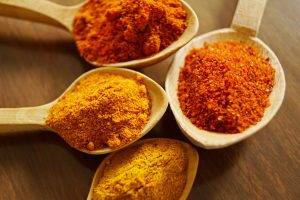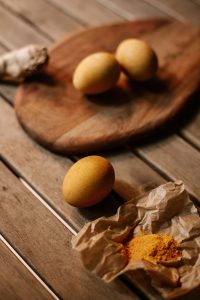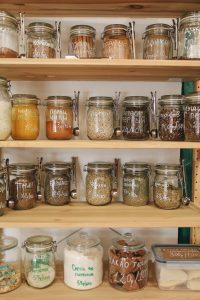Are you looking for a dry mustard substitute? Dry mustard is essential whether you want to marinade your preferred meat or give your soup an acidic, tangy flavor. The use of dry mustard is necessary for some cuisines. With its peppery flavor and scent, it enhances the dish’s flavor.
What to do if you run out of it entirely? In that case, you can always rely on an excellent dry mustard substitute, so do not worry. Moreover, several options, including Dijon mustard, horseradish powder, mustard seeds, turmeric powder, wasabi powder, and yellow mustard, are the best alternatives to dry mustard.
As you may already know, there are quite a few varieties of mustard, including Dijon and other ground varieties. However, dry mustard isn’t like the others. Not sure how? In that case, you can read this post to learn everything about substitutes for dry mustard and their best uses.
Table of Contents
Substitute for dry mustard
Everyone is familiar with dry mustard, but there is still much more to learn about this component. Therefore, this section will discover its flavor, applications, health advantages, and more.
You can yield dry mustard by grinding and drying mustard seeds, also known as mustard powder. Unlike Dijon mustard or wet mustard, it doesn’t contain any additional components. English mustard is another name for dry mustard. Depending on the type of seeds it is made from, it is frequently offered in either white or yellow. It is a common component in food all across the world.
Most savory meals pair well with dry mustard’s earthy, bitter flavor. The texture of dry mustard, which is in powder form, will be fine and gritty. Besides, adding a dijon mustard substitute or the component can enhance any dish’s flavor.
Dry mustard does not have a strong flavor like Dijon or wet mustard, which are both highly aromatic. Instead, it has a faint bitterness that acquires a flavor when added to any cuisine.
It also has a very distinctive smell. Some people love it, while others detest it. Because of these characteristics, mustard stands out among the other spices. For the same reason, if your recipe calls for the ingredient, there is a specific requirement. That is when you must come up with a dry mustard substitute, if not the original version.
How to apply dry mustard substitute correctly?
There are numerous uses for dry mustard substitute. The applications include the ones apart from the gravies and salad dressings. For various meats, dry mustard works well in marinades and spice rubs.
The base for several sorts of mustard products is dry mustard. To transform mustard into Dijon, honey, or wet mustard, you can add various substances. As a result, you will not only have the perfect substitute for dry mustard but also be able to retain the maximum flavor of a dish.
For example, when it comes to pork, dry mustard is a beautiful accent to the meals. Its scent and mildly bitter flavor pair well with foods that contain pig meat. Additionally, mustard is employed in the preparation of numerous sauces and dips. On this note, it is essential to mention that you can also choose a good substitute for ground mustard powder if the other versions are unavailable.
Now that you have enough information regarding the ingredient, it is time to look at some of the top dry mustard substitute varieties.
What is the best substitute for dry mustard?
The top alternatives to dry mustard are all on the list in this section. Additionally, you will learn how to use each option.
Mustard Seeds
Mustard seeds are used to make dry mustard. As a result, it tastes and smells much like dry mustard. Therefore, it is unquestionably among the most excellent replacements for dry mustard seeds. Moreover, dry mustard doesn’t contain any extra ingredients, unlike Dijon or wet mustard. Therefore, if you have a packet of mustard seeds on hand, you can either use it whole, ground it, or take it as a substitute for ground mustard. If you use the entire version and want to make it effective as a dry mustard alternative in all recipes, you must note the usual 1:1 substitution ratio.
Dijon Mustard
Dijon mustard has a smooth texture and a yellow tint. Its flavor profile is remarkably similar to that of dry mustard. As a result, dry mustard is often used as a substitute for dijon mustard and vice versa.
The main ingredients you may find in making Dijon mustard include white wine and mustard seeds. Moreover, one can use the main component or a Dijon mustard substitute in most meals that call for dry mustard and has a thick sauce-like consistency. However, it is preferable not to dijon mustard if the recipe calls for a dry form if you are looking for authenticity in the texture. You can also note to follow a 1:1 ratio, though, if you want to replace dry mustard with Dijon.
Yellow Mustard
Yellow mustard can replace dry mustard in most meals because of its mild flavor. Moreover, yellow mustard offers your food taste and some color. One can utilize it in its original form or blend it with some wine to create a purée. Follow the conventional 1:1 ratio when substituting yellow mustard for dry mustard.
Infusion of horseradish
The root of the horseradish plant, which is related to the mustard plant, is used to make horseradish powder. It has a strong flavor and can be used in place of dry mustard. The taste of horseradish powder is very potent.
A fragrant oil found in the horseradish plant’s roots provides the horseradish powder with its spiciness and heat. It is not, however, very accessible. Moreover, one can use horseradish powder as a replacement if one intends to use it in meat preparations. But before you add horseradish powder to any food, be conscious of how fiery it tastes.
Curcuma or turmeric powder
Colorful and fragrant turmeric powder is available quickly and tastes slightly spicy. Moreover, turmeric should be at the top of your list if you’re looking for an excellent substitute for dry mustard that is yellow.
Powdered turmeric has a bright color and a pretty distinct flavor. Therefore, your dish will become yellow with just little turmeric. However, turmeric’s flavor profile is much milder if you compare it with original dry mustard.
As an alternative to dry mustard, however, turmeric can be a fantastic complement to both vegetarian and non-vegetarian cuisine. Use half a teaspoon of turmeric instead of one teaspoon of dry mustard when making a substitution.
Wasabi Powder
The Japanese equivalent of horseradish powder is wasabi powder. One can use it in place of dry mustard because of its potent flavor. If you enjoy sushi, you must have used this wasabi powder.
This powder works well as a substitute for dry mustard in fish, meat, and vegetarian meals. Besides its spicier flavor, you should start with a little amount when using it as an alternative for dry or ground mustard.
Why Use a Dry or Ground Mustard Substitute?
Dry mustard or ground mustard component is a readily available product in the market. Furthermore, the pricing for all the versions you know about is very reasonable. So why will one substitute dry mustard with something else? It is a thoughtful query, and you can find some excellent answers to that question.
First of all, a person may have a mustard allergy. So knowing about a suitable replacement at that time can be pretty helpful. Moreover, you can still prepare your favorite Asian dishes without using mustard in that case.
It’s also possible that you don’t use mustard daily. In such a scenario, you may not have unused dry mustard in your pantry. On the other hand, even if there was one, it may be an old one beyond its expiry date. Therefore, it becomes easy to have an alternative for dry mustard in these circumstances.
Even if it’s commonly accessible, your neighborhood grocer may occasionally run out of the product. If so, there is no need for you to visit a different store because you already know about some dry mustard alternatives that you may already have in your cupboard.
Dry Mustard Substitute benefits
Despite being generally accessible, several people use very subpar dry mustard in food products. Because of this, dry mustard offers little nutritious value to your meals. However, mustard itself has a lot of health advantages. For example, it contains many antioxidants, which support your body’s ability to combat free radicals and keep you healthy.
Even if you use a dijon mustard substitute, it contains many vital nutrients. The list of nutrients includes vitamins A, B6, B12, C, D, E, and K. Moreover, mustard and its substitutes are rich in minerals, including calcium, iron, magnesium, phosphorus, and others. Therefore, although mustard is too small, it is still a very beneficial element.
Here are some important reasons why including mustard seeds in your everyday diet is beneficial for your health:
Relief from Psoriasis Symptoms
The tiny mustard seeds may help treat psoriasis, an autoimmune disease with a history of chronic inflammation. The effectiveness of mustard seed as a potential anti-inflammatory agent and as a component of future psoriasis treatments has been demonstrated in a study by a group of Chinese experts. In addition, the study suggests that using these seeds could also increase the activity of beneficial enzymes, promoting healing action against psoriasis-led legions.
Beneficial for Contact Dermatitis
In contact dermatitis, when the skin develops an itchy rash when it comes into contact with an allergen, mustard seeds may provide therapeutic relief. Consuming mustard seeds may aid in treating contact dermatitis symptoms, including tissue repair and a decrease in ear swelling, according to an animal study published in the Journal of Southern Medical University. However, to determine its effectiveness in humans, more research is needed.
Possibly Better for Cardiovascular Health
Antioxidants like carotenoids, isorhamnetin, kaempferol, and other vital plant chemicals can be abundant in mustard seeds and may protect the body from sickness and damage of any type. Additionally, these flavonoids might lower the risk of coronary heart disease.
These seeds help to make mustard oil, which is, as per experts, healthier for the heart than the majority of other cooking oils. According to a randomized trial published in the Clinical Trials Journal, patients with severe heart conditions who were also suspected of having a heart attack got moderate doses of mustard oil. As a result, they may have improved the frequency of cardiac arrhythmia, ventricular enlargement, and the chest pain that goes along with it.
Including omega-3 fatty acids in mustard oil, among other beneficial components, may be responsible for its potential cardioprotective qualities. Due to this preliminary study, future investigations into the cardiovascular effects of mustard seed hold promise.
Beneficial for Respiratory Disorders
For centuries, people have appreciated mustard seeds for their ability to treat sinus and cold symptoms. It is regarded as a fantastic expectorant and decongestant, which could aid in removing mucus from the airways. Because of its heat-generating capabilities, mustard seeds and oil have been used in various home medicines for decades to cure sinus-related conditions.
May Help with Pains
Additionally, a mustard seed plaster or poultice may assist in lessening discomfort and spasms. Given that mustard has rubefacient (redness-producing) qualities, using it as a plaster may have analgesic effects and alleviate muscle pain. Another crucial piece of information to remember is that applying mustard directly to exposed skin can have warming effects and lead to painful blisters. To prevent that, one should place a linen sheet between the skin and the plaster.
Final thoughts
By this point, you must already be familiar with all the top varieties of a dry mustard substitute. However, if you are still uncertain about which one will be most effective, here is a summary. The most appropriate alternative for dry mustard is the whole seeds. On the other hand, Yellow mustard is one of the most widely available alternatives. However, if you are looking for the best flavor and taste profile, then Dijon mustard will produce the best results undoubtedly.


